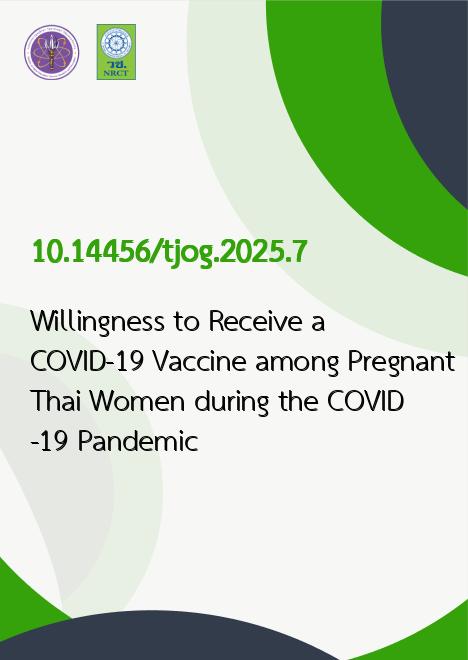
|
Willingness to Receive a COVID-19 Vaccine among Pregnant Thai Women during the COVID-19 Pandemic |
|---|---|
| รหัสดีโอไอ | |
| Creator | Ploykawin Chaiyakiat |
| Title | Willingness to Receive a COVID-19 Vaccine among Pregnant Thai Women during the COVID-19 Pandemic |
| Contributor | Farsai Chiewbangyang, Boonyavee Wongwisetsuk, Nichanan Nettakul, Prippraodao Suwansingh, Surasith Chaithongwongwatthana, Stephen J. Kerr, Nasamon Wanlapakorn |
| Publisher | PIMDEE Co., Ltd. |
| Publication Year | 2568 |
| Journal Title | Thai Journal of Obstetrics and Gynaecology |
| Journal Vol. | 33 |
| Journal No. | 1 |
| Page no. | 64-76 |
| Keyword | acceptance, hesitancy, COVID-19, pregnant women, vaccine |
| URL Website | https://tci-thaijo.org/index.php/tjog/index |
| Website title | www.tci-thaijo.org |
| ISSN | 2673-0871 |
| Abstract | Objectives: To determine the level of acceptance of COVID-19 vaccine among pregnant women residing in Thailand during the COVID-19 pandemic and assess sociodemographic, medical and informational factors influencing their acceptance. Materials and Methods: Online and paper-based questionnaires were distributed to pregnant women attending the prenatal care clinic in hospitals located in different regions of Thailand between July and October 2021. Sociodemographic characteristics, perception of risks and knowledge on COVID-19 were collected. Participants were given information on composition, safety and effectiveness, but not the commercial name and manufacturers, of the three currently available COVID-19 vaccines and were asked about their vaccine acceptance. Logistic regression analysis was used to determine factors associated with vaccine acceptance. Results: A total of 138 women completed the questionnaire. Fifty-nine percent of participants were willing to receive the Thai FDA-approved COVID-19 vaccines. mRNA vaccines (BNT162b2) had the highest acceptance (59.4%) followed by an inactivated (CoronaVac) whole virion vaccine (29.7%) and ChAdOx1-S adenoviral-vectored vaccine (17.4%). The major reason for hesitancy was safety of the mother and fetus. The degree of reliability of COVID-19 vaccine information sources was highest in personal obstetricians and lowest in state media. Pregnant women with adequate knowledge on COVID-19 had higher vaccine acceptance rates. There was no difference in the occupation, education, income, or presence of comorbidities between vaccine acceptance and vaccine hesitancy groups. Conclusion: Safety was the major reason for vaccine hesitancy, but adequate knowledge on COVID-19 can promote vaccine acceptance in Thailand. |
